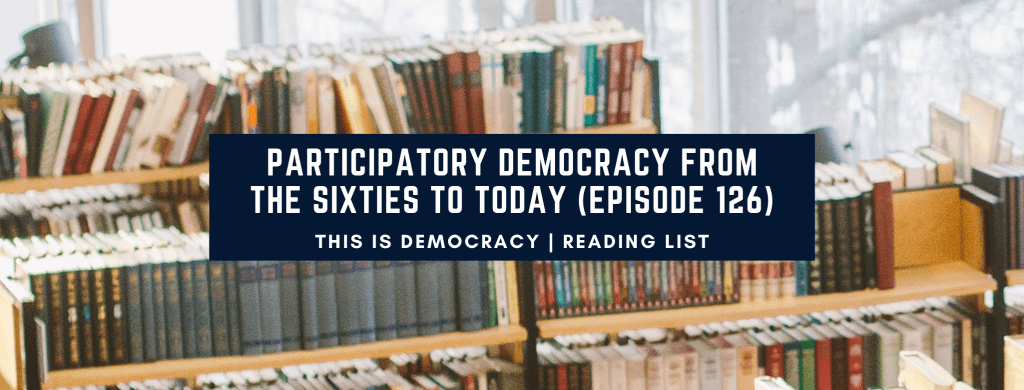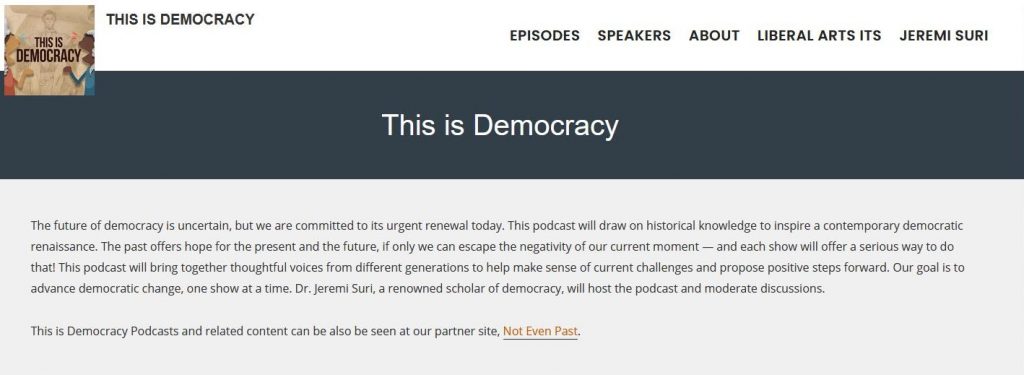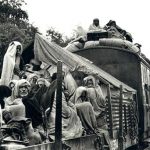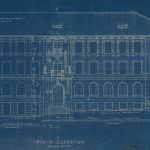
Not Even Past is proud to partner with This is Democracy, a groundbreaking podcast that brings together thoughtful voices from different generations to help make sense of current challenges and propose positive steps forward. This is Democracy Reading Lists are designed to accompany the podcast interview and to provide additional, curated readings for anyone interested in the topic under discussion.
For Episode 126 of This is Democracy, Jeremi and Zachary Suri hosted Dr. Vaneesa Cook to discuss the Port Huron Statement, and the shifting ideals of democracy in America.

And the Students for a Democratic Society really wanted to ensure that everyone had the right to vote. But beyond that, they wanted to expand democracy. So that really became a way of life for people. And they talked about democracy as a way of life.
Dr. Vaneesa Cook
Listen to the podcast below or access it here.
For further readings on the Port Huron Statement and the shifting ideals of democracy in America, Dr. Vaneesa Cook recommends the following five books.

Vaneesa Cook, Spiritual Socialists Religion and the American Left (Philadelphia: University of Pennsylvania Press, 2019)
“Refuting the common perception that the American left has a religion problem, Vaneesa Cook highlights an important but overlooked intellectual and political tradition that she calls “spiritual socialism.” Spiritual socialists emphasized the social side of socialism and believed the most basic expression of religious values—caring for the sick, tired, hungry, and exploited members of one’s community—created a firm footing for society. Their unorthodox perspective on the spiritual and cultural meaning of socialist principles helped make leftist thought more palatable to Americans, who associated socialism with Soviet atheism and autocracy. In this way, spiritual socialism continually put pressure on liberals, conservatives, and Marxists to address the essential connection between morality and social justice.
Cook tells her story through an eclectic group of activists whose lives and works span the twentieth century. Sherwood Eddy, A. J. Muste, Myles Horton, Dorothy Day, Henry Wallace, Pauli Murray, Staughton Lynd, and Martin Luther King, Jr. spoke and wrote publicly about the connection between religious values and socialism. Equality, cooperation, and peace, they argued, would not develop overnight, and a more humane society would never emerge through top-down legislation. Instead, they believed that the process of their vision of the world had to happen in homes, villages, and cities, from the bottom up.
By insisting that people start treating each other better in everyday life, spiritual socialists transformed radical activism from projects of political policy-making to grass-roots organizing. For Cook, contemporary public figures such as Senator Bernie Sanders, Pope Francis, Reverend William Barber, and Cornel West are part of a long-standing tradition that exemplifies how non-Communist socialism has gained traction in American politics.”

James Miller, Democracy is in the Streets: From Port Huron to the Siege of Chicago (Cambridge: Harvard University Press, 1994).
“On June 12, 1962, sixty young student activists drafted a manifesto for their generation, the Port Huron Statement, that ignited a decade of dissent. Democracy Is in the Streets is the definitive history of the major people and ideas that shaped the New Left in America during that turbulent decade. Because the 1960s generation is now moving into positions of power in politics, education, the media, and business, their early history is crucial to our understanding. James Miller, in his new Preface, puts the 1960s and them into a context for our time, claiming that something of value did happen: ‘Most of the large questions raised by that moment of chaotic openness—political questions about the limits of freedom, and cultural questions, too, about the authority of the past and the anarchy of the new—are with us still.'”

Doug Rossinow, The Politics of Authenticity: Liberalism, Christianity, and the New Left in America (New York: Columbia University Press, 1998).
“Breaking new ground in cultural, political, and social history, Rossinow tells the story of the new left-wing movement that emerged in the 1960s from an innovative perspective: illustrating the spiritual dimension of student activism and providing the first account “from the bottom up” — as well as linking local developments to the national scene.”

Martin Klimke, The Other Alliance: Student Protest in West Germany and the United States in the Global Sixties (Princeton: Princeton University Press, 2011).
“Using previously classified documents and original interviews, The Other Alliance examines the channels of cooperation between American and West German student movements throughout the 1960s and early 1970s, and the reactions these relationships provoked from the U.S. government. Revising the standard narratives of American and West German social mobilization, Martin Klimke demonstrates the strong transnational connections between New Left groups on both sides of the Atlantic.
Klimke shows that the cold war partnership of the American and German governments was mirrored by a coalition of rebelling counterelites, whose common political origins and opposition to the Vietnam War played a vital role in generating dissent in the United States and Europe. American protest techniques such as the “sit-in” or “teach-in” became crucial components of the main organization driving student activism in West Germany — the German Socialist Student League — and motivated American and German student activists to construct networks against global imperialism. Klimke traces the impact that Black Power and Germany’s unresolved National Socialist past had on the German student movement; he investigates how U.S. government agencies, such as the State Department’s Interagency Youth Committee, advised American policymakers on confrontations with student unrest abroad; and he highlights the challenges student protesters posed to cold war alliances.
Exploring the catalysts of cross-pollination between student protest movements on two continents, The Other Alliance is a pioneering work of transnational history.”

Jeremi Suri, Power and Protest: Global Revolution and the Rise of Detente (Cambridge: Harvard University Press, 2005).
“In a brilliantly conceived book, Jeremi Suri puts the tumultuous 1960s into a truly international perspective in the first study to examine the connections between great power diplomacy and global social protest. Profoundly disturbed by increasing social and political discontent, Cold War powers united on the international front, in the policy of detente. Though reflecting traditional balance of power considerations, detente thus also developed from a common urge for stability among leaders who by the late 1960s were worried about increasingly threatening domestic social activism.
In the early part of the decade, Cold War pressures simultaneously inspired activists and constrained leaders; within a few years activism turned revolutionary on a global scale. Suri examines the decade through leaders and protesters on three continents, including Mao Zedong, Charles de Gaulle, Martin Luther King Jr., Daniel Cohn-Bendit, and Aleksandr Solzhenitsyn. He describes connections between policy and protest from the Berkeley riots to the Prague Spring, from the Paris strikes to massive unrest in Wuhan, China.
Designed to protect the existing political order and repress movements for change, detente gradually isolated politics from the public. The growth of distrust and disillusion in nearly every society left a lasting legacy of global unrest, fragmentation, and unprecedented public skepticism toward authority.”
The views and opinions expressed in this article or video are those of the individual author(s) or presenter(s) and do not necessarily reflect the policy or views of the editors at Not Even Past, the UT Department of History, the University of Texas at Austin, or the UT System Board of Regents. Not Even Past is an online public history magazine rather than a peer-reviewed academic journal. While we make efforts to ensure that factual information in articles was obtained from reliable sources, Not Even Past is not responsible for any errors or omissions.



